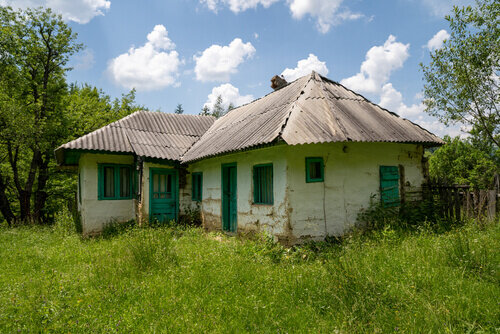
Owning a home in poor condition is like having an elephant strapped to your back, especially when it comes time to sell it. You may have inherited a headache or you may have a rental property that was trashed by bad tenants. However you got saddled with it, unloading a distressed home presents you with significant questions to answer: do you fix it up to get a good price? Do you try to sell it as-is? What if it’s in such bad condition that it doesn’t qualify for a mortgage? What if it’s completely uninhabitable? Now your forced into possibly selling a house in bad condition in Pueblo, CO
First Things First
Before you contemplate setting a lit match to your rundown house, take an objective look at your home’s true condition. Homelight points out that inspections typically categorize homes as being in poor, fair or good condition, with poor being reserved for houses no one can live in. An unlivable home will have serious issues like black mold, major structural issues, major roof damage, termite infestation and damage, and major electrical or plumbing issues. A house in this condition could even be condemned by the local building authorities. If this happens, the home may need to be torn down; however, this isn’t always the case. According to Realtor.com, some condemned houses can be successfully rehabilitated.
A home in fair condition will have issues such as floor damage, some electrical and/or plumbing issues, a roof in need of repair or replacement, wood rot, foundation issues and an outdated kitchen and/or bathrooms. A home in good condition will need only cosmetic and simple repairs, if any at all.
It’s important to know where you stand before trying to sell a house that needs work. If you’re familiar with the house, make a list of everything you know that’s wrong with it. If you aren’t familiar with the house, this is going to be more difficult. That’s why Realtor.com recommends hiring a home inspection before putting your house on the market. An unusual step? Yes! Home inspections are normally paid for by the buyer during escrow. However, if you have a distressed home it’s good to know what you’re facing ahead of time so you know which step to take next for selling a house in poor condition. Home inspection costs are typically cost between $350 and $600 for a 1500 square foot house, says Realtor.com. Bear in mind that you’re legally obligated to disclose anything you find to potential buyers.
Decision Time
Once you know the extent of the damage to your house, it’s time to choose one of three options. First, you can repair some of the damage before putting it up for sale. Second, you can sell it as-is either through a realtor or for sale by owner. Third, you can pass the headache on to a cash home buyer who specializes in buying distressed properties and flipping them for a profit. Each choice has its benefits and drawbacks. Which you choose depends on your circumstances, how much money you have to invest and how much time you want to spend on it.

If you’ve got the money and the time, addressing some of the repairs can net you a bigger payday when selling a house in poor condition. Make sure, however, to make repairs that are going to give you a return on your investment, or ROI. If your home needs a new roof, for example, don’t skip that in favor of painting a living room. Take care of as much of the big stuff — termite infestation, black mold, roof repair — as you can afford to do. While a lot of buyers say they want a fixer-up, they aren’t actually looking to fix a house from the ground up.
Let’s say money is tight and you don’t have the resources to repair your house. In this case, consider selling as-is. When you list a home as-is you’re acknowledging to prospective buyers that you want to sell a house that needs work, but you aren’t going to do any of it. Buyers then know up-front what they’re getting in to. Even if their own inspection uncovers new issues, you don’t have to budge from your asking price. Of course, buyers are always free to make a counter-offer and you’re free to accept it.
You can choose to sell the house yourself or have a realtor represent you. The benefit of selling it yourself is, of course, you won’t have to pay commission fees. However, you also won’t have the expertise of a realtor on your side, who will have an understanding of the current market and will know how to negotiate to get the best price for your home. Remember, the current state of the house isn’t all that matters. The land your home sits on also has value, and if your home can be repaired it’s worth money as well. Your realtor can keep you focused on the value of your property and won’t let you accept an offer that’s too low.
Finally, you can sell to a cash buyer. You’ve seen the advertisements, right? They usually say something like, “We buy ugly houses for cash!” or “We buy houses in any condition!” These are real estate investors who want to flip your property for as much money as possible.
The advantage of going with a cash home buyer is you’ll get a quick offer regardless of the condition of your home and, if you accept, you’ll get money right away. You won’t need to sink any of your own money into making repairs. This bypasses a lot of red tape and paperwork, and you won’t pay any realtor’s commission fees.
However, you have to be on the lookout for unscrupulous investors who will play a bait-and-switch game with you, promising to pay a high price for your home and then stalling for so long that you get exhausted. Finally, they make another offer, significantly below the original, banking on the hope that you’re so tired of the process that you’ll cave in and accept.
Do your homework if you’re thinking of going with a cash home buyer. Check reviews. Ask your friends for referrals. Meet with several investors and ask for offers from each of them, then compare them.
The Bottom Line
The bottom line is your house, whatever its current condition, is worth money. Whether it’s been eaten up by termites, partially destroyed by a fire or had a tree fall on it, your house and the land it sits on is worth something to someone. If you can spend the time and resources to at least clean up the yard, cut back any overgrowth of bushes and trees, and tidy up the house, removing clutter, furniture and debris, do so. If you have the money to do more, make sure you’re making repairs that are going to bring you more money in the end. Consider making use of the experience of an established realtor. And if you simply can’t do anything at all with the house, going with an investor with a cash offer might be the right choice for you.
316 W Evans Ave
Pueblo, Co 81004
719-299-0741
